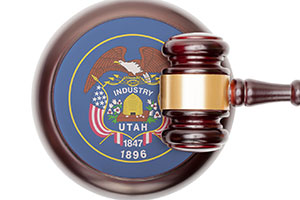The Utah Supreme Court has ruled that a district court went too far when it allowed an expert to offer undisclosed causation testimony.
The Injury
Noe Arreguin-Leon was injured while installing an exit sign on the shoulder of I-15. A driver had fallen asleep at the wheel and the car veered off the road and into a ladder, where Arreguin-Leon was standing.
At the time of his injury, Arreguin-Leon was employed by Highway Striping & Signs. This company had been hired by Hadco, a general contractor, to install signage for the Utah Department of Transportation. Part of Hadco’s task was to implement a “traffic control plan” to protect workers from traffic and drivers from the construction site. Hadco had failed to do so. At the time of Arreguin-Leon’s accident, there were no traffic control measures in place.
Arreguin-Leon suffered significant injuries and sued the driver and Hadco.
District Court
In district court, Arreguin-Leon retained Bruce Reading to testify as an expert on traffic control standards. Hadco’s counsel chose to depose Reading instead of receiving an expert report. At trial, Reading testified “that Hadco or its subcontractor had violated five specific engineering practices, regulatory standards, and contractual provisions and that there was no traffic control plan in place at the accident site.”
Arreguin-Leon’s counsel asked Reading, “If [200 yards from the construction project is] where [the driver] started to exit the roadway, what effect would a correctly installed buffer zone have had on his driving?” Hadco’s counsel objected, arguing that this testimony was going toward causation and was beyond the scope of the opinion that was disclosed. Arreguin-Leon’s counsel argued that because a deposition had been elected instead of a report, Reading’s testimony was not limited. The court overruled the objection.
Reading testified that a proper traffic plan would have included an area where the driver would have to have hit one or more plastic barrels and “would have had closer to six seconds to wake up and take corrective action.” He also testified that if the accident had still taken place, it would not have taken place in the same location.
A jury ultimately found that Hadco was partially liable for Arreguin-Leon’s injury. Hadco appealed.
Court of Appeals
On appeal, Hadco argued that the district court erred by allowing Reading to offer an undisclosed opinion on causation. Arreguin-Leon argued that Hadco could not make this argument without relying on the expert disclosures and deposition transcript, but these were not a part of the trial record. The court of appeals acknowledged that these documents were not officially part of the trial record, but considered them because of the unique facts of the case.
The court of appeals concluded that the district court abused its discretion in allowing Reading to testify about causation at trial. It determined that the error was harmful and required a new trial.
Utah Supreme Court
Arreguin-Leon petitioned the Utah Supreme Court for certiorari. The court granted his request.
In reviewing the case, the court determined that the expert disclosures and deposition transcript were not necessary to Hadco’s argument or the court of appeals’ ruling. The court noted that the fact that a party’s opponent chooses a deposition instead of an expert witness report does not mean that the expert’s trial testimony can be a “free-for-all.”
The Utah Supreme Court agreed with the court of appeals that Reading improperly testified about causation and that the error was harmful. The court affirmed the court of appeals’ decision and remanded the case to the district court for a new trial.




